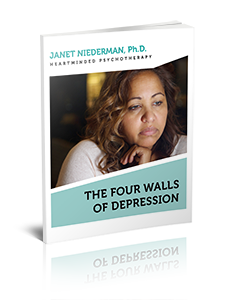When grief for your own life has hardened into stone… as a Depression Therapist I can help.
 The suffering that depression brings takes many forms. Do you recognize any of these in yourself?
The suffering that depression brings takes many forms. Do you recognize any of these in yourself?
- You have difficulty sleeping.
- You barely have enough energy to get out of bed.
- You no longer have the patience to respond thoughtfully to others without getting irritable.
- It’s hard to concentrate and do your work.
- There’s a voice inside your head criticizing you non-stop.
- Your favorite activities don’t lift you up the way they once did.
- You repeatedly face feelings of loneliness, worthlessness or hopelessness.
- Thoughts of harming yourself have become frequent or more intense.
- You haven’t been yourself for a while.
Depression is different from simple sadness. Sadness occurs in response to a situation or life event. It’s an emotion that moves through us like a flowing river. But depression is a river that’s been turned to ice—hardened, frozen, and seemingly permanent. You’ve tried every way you know to break through it, but nothing’s worked.
The Experience of Depression is Widespread
Many folks struggle with depression. According to the National Institute of Mental Health, in 2017 an estimated 17.3 million adults aged 18 or older had at least one major depressive episode. Figures show that depression costs the U.S. economy approximately $210.5 billion a year. This mind-boggling figure includes both absenteeism (missed days from work) and presenteeism (reduced productivity while at work) in addition to medical costs. According to a Global Burden of Disease study that included both physical and mental illnesses, major depressive disorder (MDD) is the second leading cause of disability worldwide.
 Depression has always been part of the human condition, but today’s stresses add to the problem. Technology has left us with less face-to-face human contact. We’re lonelier, more pressured by time, and constantly bombarded by negative news. Moreover, we’ve been taught to hide our feelings, and just “get on with it,” leaving emotional wounds to fester.
Depression has always been part of the human condition, but today’s stresses add to the problem. Technology has left us with less face-to-face human contact. We’re lonelier, more pressured by time, and constantly bombarded by negative news. Moreover, we’ve been taught to hide our feelings, and just “get on with it,” leaving emotional wounds to fester.
Sometimes, depression’s negative thoughts bring you to a place of wanting to harm or kill yourself. If that’s what you’re thinking about currently, go to the nearest emergency room, call 911, or click here to find the emergency phone numbers to get the help you need right away. Postpone reading the rest of this page till after you are safe.
Even when not feeling suicidal, asking for help can be hard for many reasons. Depression can leave you without enough energy to make the phone call to request what you need or can make you unwilling to take care of yourself. Alternatively, negative thoughts can convince you you’re not worth the time or money it will take to get better.
But overcoming depression is possible. You may have to start from “first things first” and push back against the myths about depression that prevent you from reaching out for help. It may be important to hush your memories of folks who’ve criticized you for being depressed. Whether they said you were just being lazy or simply weak-willed, they were wrong. This is not about willpower. Depression is real and you deserve to recover.
What Can I Offer You In Therapy For Depression?
We’ll begin by exploring all the reasons you’re feeling lost and disconnected and discover what needs to be done for you to reclaim your ability to thrive.
You need compassion and understanding for all you’ve been through. That’s why I offer an empathetic environment that allows you to speak about your depression without fear of judgment. We will start by helping you develop compassion and self-care, even if initially you can only feel them for moments at a time. Eventually, we’ll learn what helps your feelings of wellbeing carry over from session to session.
We will unpack the various issues in your life that have led your river of sadness to turn into a river of frozen ice. Depression has many different causes with each one requiring its own unique response. That’s why working with you is not a “one size fits all” approach. We may work through a variety of issues, such as:
- grieving and healing your painful emotions of loss.
- searching for anger that got bottled inside when you got hurt.
- hushing your inner critic, who says horrible things that feel awful.
- taking a compassionate look at your self-esteem to see whether it’s sitting on shaky ground and needs to be rebuilt from the inside out.
- releasing the energy underlying painful emotions and beliefs so that they truly exit your mind and body.
- releasing core convictions formed in childhood from their constrictive hold.
- loosening the psychological defenses that once helped you survive but that now block you from being your true self.
Working through such issues in therapy allows you to experience new ways of living in the world. You can finally achieve the inner nurturance and self-direction you’ve always craved and arrive at wholeness.
You may have some reservations about therapy for depression…
I don’t think therapy will actually help me get better.
If these are the thoughts you’ve having, then the best place to start is by telling yourself: “One of the major symptoms of depression is having negative thoughts. I need to stop believing that my negative thoughts equal the truth.” The more you can realize that your negative thoughts are a symptom, the easier it will be to ask for help.
Why can’t I just ask my doctor to give me medication for depression?
Sometimes an anti-depressant is an important part of treatment, especially when specific physical indicators are present. When appetite, weight, or sleep have been negatively affected by depression, taking this step may be a very important part of getting well again. But an anti-depressant is not typically a complete solution. Many people who stop their anti-depressants discover that their depression returns. Their underlying psychological and interpersonal issues have not been resolved by taking medicine. Psychotherapy, in contrast, opens these issues to the possibility of resolution.
 There are lots of places I need to put my money right now. Why invest it in therapy?
There are lots of places I need to put my money right now. Why invest it in therapy?
There are many ways to measure costs. Comparing the cost of therapy to the cost of material things may not be the most helpful comparison when making a decision about whether to invest in yourself. The cost of therapy needs to be measured against the costs of not getting the help you need. I invite you to be honest about the true costs of your untreated depression.
- Is depression stopping you from functioning at your best? Will staying depressed result in not getting promoted, getting fired, or failing?
- Is depression stopping you from expressing your true needs in your relationship, leading you (and perhaps your partner) to feel miserable? How much does that cost? How much will ending that relationship or a divorce cost, financially and otherwise?
- Is your depression contributing to your irritability? Is it affecting your relationship with your children? What does that cost, both now and in the future?
The larger question is: Are you living life in black-and-white, instead of in living color? This cost may be incalculable. These are all hard questions. Figuring out the answers may help you re-prioritize your needs.
A Depression Therapist Who Can Help You Heal
I’ve guided many individuals on their journey to feeling better, to recognizing their depression has lifted, and to re-engaging much more effectively with the world as it really is.
For these individuals, both their inner smile and their outer smile have let us know that the therapeutic work has been completed.
If you wish to learn more about the symptoms of depression, download my Free Report. When you’re ready, please schedule a free phone consultation with me so that I can respond to any further questions you might have. I know you’re worth asking for the help you need.
If you prefer to email me a brief message, click here.

